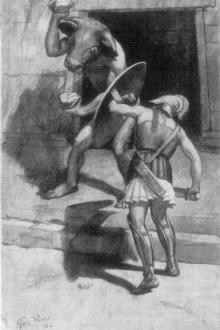The Story of the Greeks, H. A. Guerber [year 2 reading books .txt] 📗

- Author: H. A. Guerber
- Performer: -
Book online «The Story of the Greeks, H. A. Guerber [year 2 reading books .txt] 📗». Author H. A. Guerber
Alexander was always the first to rush forward in battle, and he now led the way across the river. He was longing to meet the Persians again, and was very glad to overtake them on the other side of the Tigris.
Here, on the plains of Ar-be´la, the third great battle was fought, and Alexander won the victory. Darius fled once more before the conqueror, while Alexander marched straight on to Bab´y-lon, the most wonderful city in the East.
C. DEATH OF DARIUS.Alexander soon won the good will of the Babylonians by allowing them to rebuild the Temple of Bel, which had been destroyed. He also secured the affections of the captive Jews; for he excused them from doing any work on this building as soon as he heard that they considered it the Tower of Babel, and hence objected to aiding in its erection.
The young conqueror spent one month in Babylon, and then went on to Su´sa. There he found the brazen statue of Athene which Xerxes had carried off to Persia; and he sent it back to the Athenians, who received it with much joy.
The Persian queen now became very ill, and, in spite of the utmost care, she soon died. Throughout her illness, Alexander was most thoughtful and attentive; and when she died, he gave orders that she should be buried with all the pomp due to her high rank.
He also comforted the mourning Sisygambis, and sent the news of the queen's death to Darius, who had fled to the northern part of his kingdom, where he was hastily gathering together another army. Touched by Alexander's conduct, Darius now wrote to him, offering peace, and proposing to share the throne of Persia with him.
The young conqueror's head had been turned by his many victories, and he was growing more haughty every day: so he proudly refused this proposal, saying that the world could not have two masters any more than two suns.
In his pride, Alexander now assumed the dress and state of an Oriental king, surrounded himself with luxury, and spent most of his time in feasting and revelry. His courtiers encouraged him in this folly, and he soon forgot the wise lessons taught by Aristotle.
On several occasions the young king drank so much that he did not know what he was doing; and once, in a fit of drunken rage, he set fire to the beautiful palace of Per-sep´o-lis, and burned it to the ground.
As he had refused Darius' offers of peace, he soon considered it necessary to continue the war: so, laying aside his jeweled robes, he put on his armor and set out for the north. He was about to overtake the Persian king, when Darius was mortally wounded by one of his followers named Bes´sus.
The traitor thought that he would win Alexander's favor by this crime, and came and boasted of it to him. Alexander was so angry, however, that he bade his guards seize Bessus, and had him put to death in the most barbarous way.
When the Macedonian king finally came up with Darius, he found him bathed in his own blood, and breathing his last. He had only time to assure him of the safety of his family, and to promise to continue to protect them, before Darius sank back dead.
By Alexander's orders the body was embalmed, and carried to Sisygambis, so that it could be properly buried in the beautiful tomb of the Persian kings. This last act of generosity quite won the aged queen's heart; and she felt so grateful, that she loved Alexander as long as he lived.
CI. DEFEAT OF PORUS.Now that Darius was dead, Alexander took the Persian title of "Shah in Shah" (king of kings), and became ruler of all the empire which had been subject to the Persian monarch.
He was so proud of his new state and of his vast conquests, that he entirely forgot that he owed them mostly to his brave generals and soldiers; and he became so obstinate, that he would no longer listen to any advice, and only thought of having his own way.
His father's general, Parmenio, who had always given him the wisest counsel, was no longer in favor, because he tried to restrain the king's extravagance. Indeed, Alexander's once generous and noble nature was so changed, that, when his courtiers accused Parmenio of treachery, he listened to them, and actually put the faithful general to death.
Every day now Alexander indulged in feasts and banquets, always drinking more and more, although it was affecting his health as well as his temper. Clytus, the son of his old nurse, tried to check his excesses, but only succeeded in provoking his wrath.
On one occasion such remonstrances so enraged Alexander, that in his drunken fury he seized a spear and killed Clytus. When he saw him dead at his feet, the king realized what a terrible crime he had committed, and felt deep remorse for a short time.
He reformed, and, instead of giving himself up entirely to pleasure, spent the next two years in the work of governing Persia, where he founded several cities called by his name.
As all the central part of Asia now acknowledged his rule, he next went down into India, where he found King Po´rus, the bravest adversary he had ever met. This king, whose realm was in the northwestern part of India, came against Alexander with a very large army. In the ranks were many elephants, trained to crush the enemy beneath their huge feet, and bearing on their broad backs wooden turrets filled with brave fighting men and good archers.
In spite of these elephants, which at first awakened great fear in the Greek soldiers, the Macedonian phalanx won the victory as usual, and Porus was made prisoner. He was led into the presence of Alexander, who haughtily asked him how he expected to be treated. "Like a king!" was the proud reply.
This answer so pleased Alexander, that he not only set Porus free, but even allowed him to keep his kingdom, after he had sworn to be the faithful subject of his conqueror.
Alexander, having thus won the help and affection of Porus, made war against several other Indian kings, and continued his advance toward the south. In one of these battles he lost his faithful steed Bucephalus, which had borne him safely through many a fight.
Alexander felt this loss deeply, and not only had a monument built over his remains, but also founded a city near by, which was called Bu-ceph´a-la.
CII. THE RETURN TO BABYLON.Upon reaching the Hyph´a-sis River, Alexander would have liked to cross it, and continue his conquests; but his soldiers now refused to go any farther. They were tired of fighting and danger, and were longing to go back to Macedon.
Although he was unwilling to do so, Alexander was therefore obliged to stop in his conquests; but, instead of going home as he had come, he now built a fleet, and sailed down the In´dus River to the sea.
Now, the Greeks had no maps such as we have; and their knowledge of geography was very small. When Alexander came to the sea, however, he thought it must be the same as that into which the Euphrates flowed.
To find out if this was true, he bade his admiral, Ne-ar´chus, sail along the coast and explore it, while the army went homeward on foot. Alexander himself staid with the army, and led the soldiers along a new way, which was very wearisome and dangerous.
The Macedonians had to pass through large wastes of burning sand, where they suffered a great deal. They were cheered and encouraged, however, by the example of Alexander, who nobly shared their hardships, and always went ahead of them on foot, carrying his own armor.
Once, when they were panting with thirst, some of his men found a little water, which they brought him. Rather than indulge in anything which all could not share with him, Alexander poured the water out upon the sand, saying he would refresh himself only when his men could do so too.
After many months of weary travel and great suffering, the army finally joined the fleet at the mouth of the Euphrates, for Nearchus had in the mean while sailed all along the northern coast of the Indian Ocean and up the Persian Gulf.
He wrote an account of this wonderful sea journey, which was of great importance, as it opened a new and convenient road for Eastern commerce. The people soon took advantage of it to establish colonies and trading stations, and to carry on a lively business with the East.
CIII. DEATH OF ALEXANDER THE GREAT.Alexander now went back to Babylon, where he married Rox-an´a, a Persian princess, giving her sister's hand to his intimate friend Hephæstion. This wedding was celebrated with great pomp, for eighty Macedonian officers took Persian wives on the same day.
The feasting for the weddings went on for many days, and the revelry was carried to such a shameful excess, that Hephæstion actually drank himself to death.
In token of sorrow, Alexander built him a fine tomb, had him buried with all the magnificence possible, and even decreed that he should henceforth be worshiped as a god. In this folly he was upheld by the priests, who were now ready to grant his every wish, and were always filling his mind with their senseless flatteries.
Alexander then fell into his old habits more than ever. He had again assumed all the pomp of an Eastern king, and sat on a wonderful golden throne. Over his head was the golden vine that had formerly belonged to the first Darius. Its leaves were of emeralds, while its grapes were clusters of fine carbuncles.
This vine had been given to a Persian king by Crœ´sus, the wealthy ruler of Lyd´i-a, and was considered one of the most precious treasures which the young conqueror had won.
But in spite of all Alexander's successes, he was not nearly so happy as he used to be when only king of Macedon. He no longer enjoyed the fine health which had helped him to bear the greatest hardships, and, weakened by over eating and drinking, he soon fell dangerously ill.
The doctors crowded around his bed, doing their best to save him, but they soon saw that he would die. When the Macedonian soldiers heard this, they were beside themselves with grief, and one and all insisted upon seeing their beloved leader once more.
Silently and sadly they filed past his bed, gazing upon the dying face which they had seen so bright and full of life a short time before. As most of the soldiers were older than their king, they had never expected to outlive him; and every one said that it was sad to die thus, at thirty-three, when master of nearly all the known world.
Just before he died, some one begged Alexander to name his successor. He hesitated for a moment, then drew his signet ring from his finger, gave it to Per-dic´cas, his principal general, and whispered that the strongest among them should have the throne.
Alexander's death was mourned by all, for, in spite of his folly and excesses, he was generally beloved. Even Sisygambis, the Persian queen whom he had taken captive a few





Comments (0)